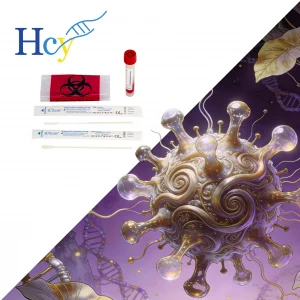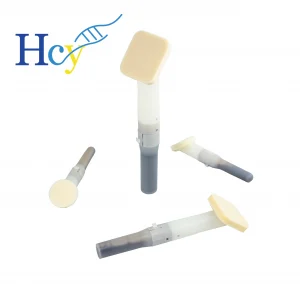Three main tests can detect whether a person is infected with COVID-19: PCR Nucleic Acid Test, Antigen Test, and Antibody Test.
PCR Nucleic Acid Test
The PCR nucleic acid test is the most accurate diagnostic test that can tell if you are infected with the coronavirus. The PCR test is unlikely to produce a false positive; if you test positive, you can be sure you are infected.
This is the most reliable test for new coronavirus, but it takes longer to build up enough virus in your body to measure it. People tested early (within 5 days of exposure to the patient) may test false negatives even if infected. This is due to the virus’s incubation period, which takes a while to appear in body fluids. If you are asymptomatic, you should wait 5 days after possible exposure to the virus before getting tested.
Test: The PCR test uses a nasal swab, nasopharyngeal swab, or saliva sample to detect the genetic material of the coronavirus.
Test results: A positive result means you are infected with the coronavirus. A negative result means that the virus is not detected.
Test: Within 48 hours
Rapid Antigen Test
This is the fastest diagnostic test but is less accurate than the nucleic acid test and is suitable for use in settings where rapid or repeat testing is required. It can produce false negatives, especially after the first week of infection. This means that even if you receive a negative test result, you may still be infected with the coronavirus. Also, as with PCR testing, there may not be enough virus in a person tested within 5 days of exposure to detect it. If you have symptoms of COVID-19, you should follow the self-isolation rules even if you have a negative antigen test result.
Test substance: Antigen testing uses a nasal or throat swab to detect proteins (called antigens) from the coronavirus.
Test result: A positive result means that you have coronavirus. A negative result means that the virus is not detected.
Test: About 20 minutes
Antibody Test
The antibody test detects whether you have been infected with the New Coronavirus in the past, not whether you are currently infected.
A positive antibody test does not guarantee that you are immune to the virus, and we do not know how much protection the antibodies provide or how long they remain in the body. An antibody test may produce a false negative if done too soon after infection and before the antibodies appear.
Test: This blood test detects antibodies to the coronavirus. Antibodies are proteins that your body produces to help fight future infections.
Test result: A positive result means you have had a coronavirus infection in the past. It takes about 1-3 weeks for your body to produce antibodies after infection. A negative result means that no antibodies were detected.
Test: about 20 minutes
Some antibody tests may cross-react with other coronaviruses that are not SARS-CoV-2 (the virus that causes new coronavirus pneumonia), which may produce a false positive result.
COVID-19 test results apply only to the moment you are tested; if you are exposed to someone carrying the virus after you are tested, you may still be infected. For example, if you get a negative test before you travel, you can still get the virus on the plane and spread it to others at your destination. That’s why you should always take precautions to prevent the spread of COVID-19.
 A professional supplier of swabs
A professional supplier of swabs




